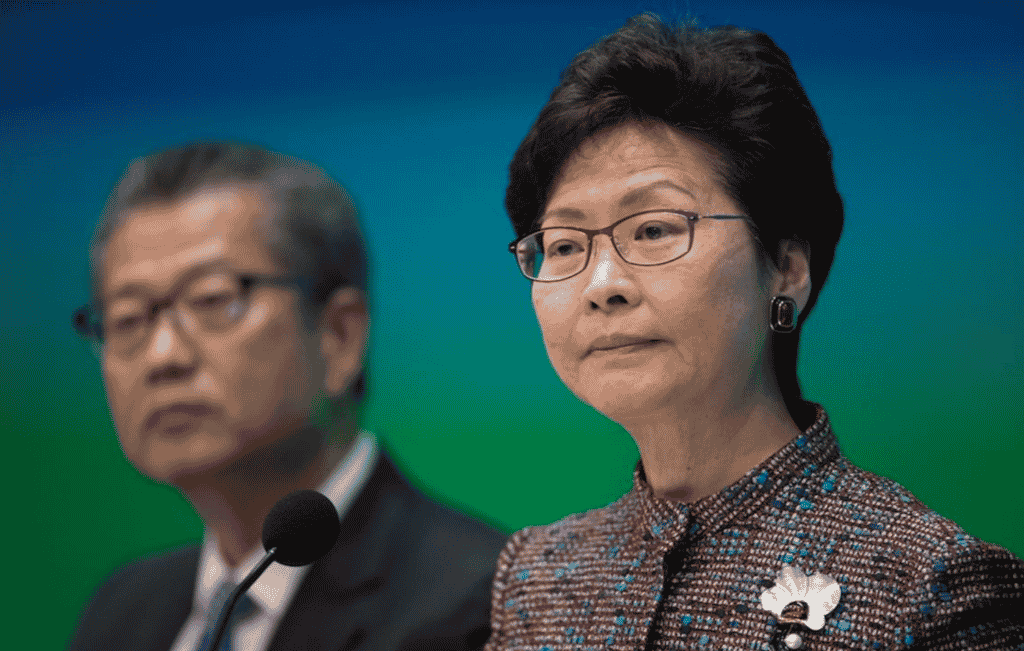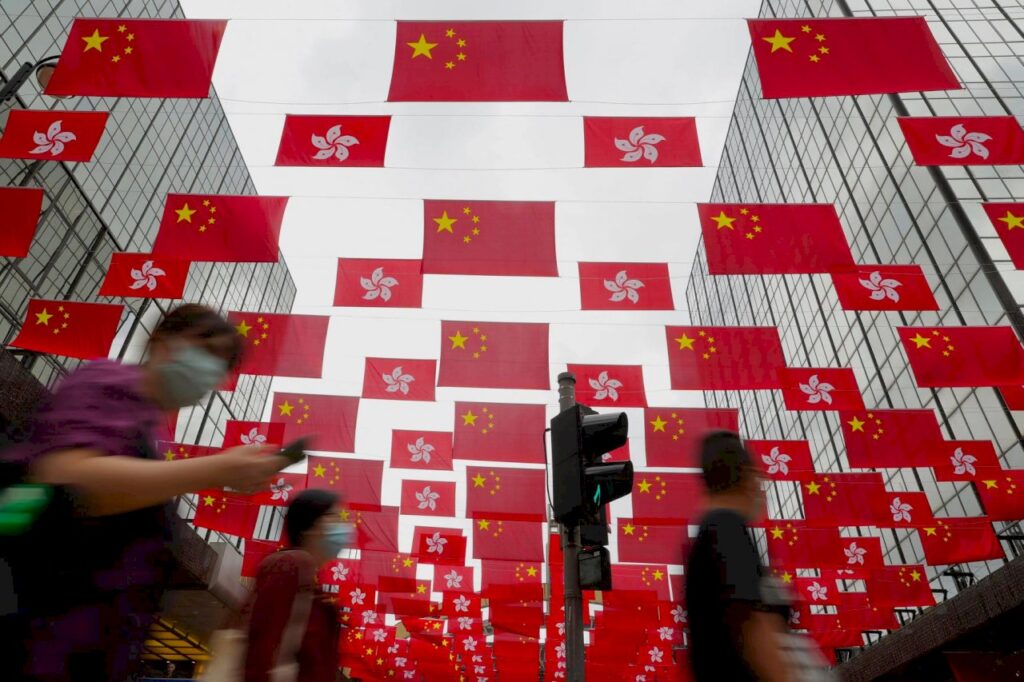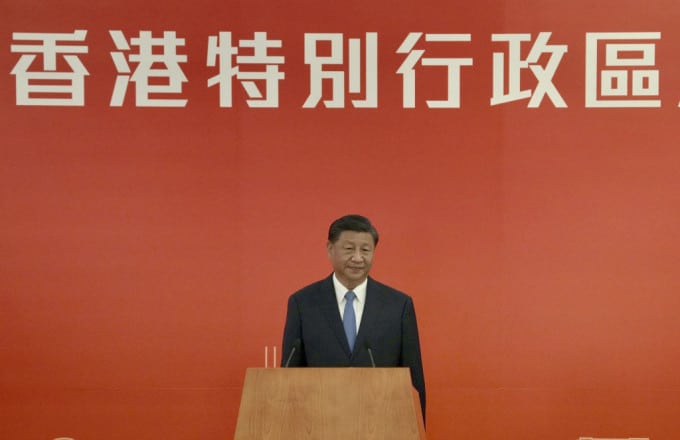The concept of "one country, two systems" requires "seeking common ground while reserving great differences." It is natural for a pluralistic society to have different opinions. Faced with the long-term accumulation of antagonism among citizens and public opinion, "great reconciliation" to resolve conflicts is believed to be the wish of most citizens. The new government focuses on improving people's livelihood and dealing with long-standing and difficult issues such as land and housing. In particular, it needs to seek compromise and consensus. This article will use opinion polls and big data technology to analyze whether the polarized atmosphere in society has eased after the first anniversary of Carrie Lam's administration from the perspective of the chief executive's popularity, public sentiment and changes in public opinion.
Social dissatisfaction gradually subsides
The chief executive's popularity is often used as an indicator to review the performance of the special zone. It reflects citizens' satisfaction and confidence in the government and is closely related to the social atmosphere at that time. There are two well-known polling organizations in Hong Kong that regularly conduct tracking surveys on the popularity of the chief executive, namely the Public Opinion Research Program of the University of Hong Kong (hereinafter referred to as the "HKU Public Opinion Research") and the Hong Kong Asia-Pacific Institute of the Chinese University of Hong Kong (hereinafter referred to as the "Asia-Pacific Institute"). In order to observe the changes brought about by the new government one year after taking office, we tried to compare the popularity trends of Carrie Lam and Leung Chun-ying, and found that the social atmosphere has been greatly different.
The University of Hong Kong's Institute for Economic Research surveys the chief executive's support every two weeks, while the Asia-Pacific Institute conducts surveys monthly. From March 2012 to June 2017, the former investigated Leung Chun-ying's rating a total of 133 times, with scores ranging from 35.0 to 56.5, while the latter investigated 64 times, with scores ranging from 38.6 to 55.7. The scores from the two polling organizations are similar, and the overall trend is getting worse. Affected by the free TV license turmoil and the UGL incident, the ratings fell sharply in November 2013 and October 2014. In January 2017, it is believed that the ratings soared after Leung Chun-ying announced that he would give up running for re-election.
From March 2017 to the present, the Hong Kong University Private Research Institute has investigated Carrie Lam’s score 33 times, with scores ranging from 52.2 to 63.6, most recently 55.6. The Asia-Pacific Institute has conducted 16 surveys, with scores ranging from 53.9 to 57.8, most recently 55.5. point. HKU Minyan has larger fluctuations, but the scores of the two are roughly similar and overall stable. In November 2017, Carrie Lam's first "Policy Address" was approved by the Legislative Council for the first time in nine years with the support of pan-democratic lawmakers. It was the highest popularity point during her tenure. In January 2018, candidates for the Legislative Council by-election were disqualified, which was a month where the ratings dropped significantly.
Comparing the ratings of the two chief executives, Carrie Lam is obviously much higher than Leung Chun-ying. The dissatisfaction projected by society on the chief executive seems to have gradually subsided. In order to confirm whether the change in popularity is significant, both polling organizations indicate whether the change in ratings reaches a statistically significant level. However, the relevant tests are limited to comparisons with the previous round of surveys, and the two polling agencies have never analyzed the changes in the popularity of each chief executive during the entire term. We will use another two sets of data, namely the "Public Sentiment Index" from the University of Hong Kong and the "One Country, Two Systems" Public Opinion Index from the Democratic Thinking Institute, to judge the changes in the social and political and economic environment after Carrie Lam took office from the perspective of public sentiment and public opinion.
Gauge public sentiment and public opinion
The Public Sentiment Index of the University of Hong Kong reflects the general public's evaluation of the political, social and economic environment. The data covers 1992 to mid-2018. The "Public Sentiment Index" aims to "quantify the emotional response of Hong Kong citizens to Hong Kong society to explain and predict the possibility of collective action in society." It encompasses the two concepts of "political connectivity" and "humanity" and is managed by the evaluation of the overall government. It is a combination of the "political evaluation value" of political performance and the "social evaluation value" of the overall social situation. The index is displayed from 0 to 200, with 100 representing normal.
The democratic-minded "One Country, Two Systems" Public Opinion Index uses big data technology to measure media sentiment, covering the net emotional value of newspaper articles on "One Country, Two Systems" from April 1998 to June 2018. It collected more than 128,000 reports from 20 local newspapers and more than 6,400 Million words. We use computer calculations to decompose the article into examples, and calculate the number of positive and negative examples contained in each paragraph. The sentiment score of each article is the net emotional value of each paragraph adjusted by the number of words. The "One Country, Two Systems" public opinion index is the average sentiment score of all articles in that month. The base month is July 2017, and the base number is 100 to mark the 20th anniversary of the return.
Newspapers are only part of the media. The public opinion index does not include other traditional media or new media, so the coverage is insufficient. However, measuring news sentiment for television and radio is difficult because they do not have comprehensive text databases. Furthermore, the credibility of newspapers is regularly assessed by widely recognized surveys, but the credibility of new media has no comparable evaluation.
In addition, many newspapers also disseminate through online media such as websites and mobile apps. The reports in these online media are mostly the same as the printed versions. To ensure reliability, the Public Opinion Index uses the "Citizens' Rating of Media Credibility" from the Center for Communication and Public Opinion Research at the Chinese University of Hong Kong to weight the sentiment score of each newspaper. Printed newspapers, an important part of the mass media, are used to assess overall public opinion. .
[Figure 1] and [Figure 2] show the monthly "Public Sentiment Index" and "One Country, Two Systems" public opinion index for the past seven years from July 2011 to June 2018, covering the terms of three Chief Executives, namely Donald Tsang's last term. One year, Leung Chun-ying’s 5 years, and Carrie Lam’s first year. The dots in the chart are the actual scores. The "Public Sentiment Index" has a similar trend to the Chief Executive's popularity. Before Carrie Lam took office, it had been below 100 points, and there was a clear downward trend. After taking office, it exceeded 100 points. The "One Country, Two Systems" public opinion index reached a low of 73 points in mid-2016 after the "Causeway Bay Bookstore" incident and the Mong Kok riots, and then rose to 99 points in mid-2018.
In order to determine whether the trends of the "Public Sentiment Index" and the "One Country, Two Systems" public opinion index have changed under the administration of each Chief Executive, this article uses the least squares method to calculate the three sets of linear trends that best match the scores of the three Chief Executives. The results are displayed as horizontal lines in [ Figure 1] and [Figure 2], and use the Chow test to test whether there is a structural break.
Looking at the "Public Sentiment Index" from [Figure 1], Donald Tsang dropped from 81 points to 75 points in his last year in office, while Leung Chun-ying's score remained at a similar level in his first year in office. Statistical tests show that since Donald Tsang and Leung Chun-ying had similar scores during the handover period, the replacement of the chief executive did not bring about structural changes.
The "Public Sentiment Index" showed an obvious downward trend during Leung Chun-ying's term, from 89 points in the first month of his administration to 66 points in June 2017, the last month of his administration. The decline reached a statistically significant level. After Carrie Lam took office, the index rose sharply to 106 points in the first month. During the handover period between Leung Chun-ying and Carrie Lam Cheng Yuet-ngor, there was a structural change that reached a statistically significant level. During Carrie Lam's first year in office, the "Public Sentiment Index" score fluctuated between a low of 102 and a high of 116. The score in June 2017 was 108 points, slightly higher than the 106 points a year earlier, with no statistically significant change in the score over the year.
Looking at the "One Country, Two Systems" public opinion index from [Figure 2], it is the same as the statistical test results of the "Public Sentiment Index". The trend of the public opinion index declined during Donald Tsang's term, while it remained at a low level after Leung Chun-ying took office. There was no structural change in the transition between the two. However, there was a structural change in the handover between Leung Chun-ying and Carrie Lam, which reached a statistically significant level.
Although Leung Chun-ying's public opinion index seems to be gradually rising during his term, this increase mainly comes from Leung Chun-ying's announcement in December 2016 that he would give up running for re-election. After the public learned that the chief executive would be replaced, the public opinion index soared from 80 points in November 2016 to 100 points in June 2017. If we exclude scores from November 2016 onwards, the upward trend during Leung Chun-ying’s tenure will disappear. The trend of scores during Lam's first year in office increased slightly, but the increase did not reach a statistically significant level.
After experiencing the torment of polarization, the social atmosphere has become moderate again. The jump in the chief executive's popularity not only stems from citizens' recognition of the SAR's performance, but also reflects their growing trust in the new government. When the Chief Executive was changed from Leung Chun-ying to Carrie Lam, both public sentiment and public opinion indexes rose sharply, reflecting statistically significant structural changes. It confirmed that under Carrie Lam's administration, the sentiments of citizens and public opinion have simultaneously eased, reshaping moderate politics as "one country, two systems" "The basis of the way out.
Song Enrong is the co-convener (research) of Democratic Ideas and deputy director of the Economic Research Center of the Chinese University of Hong Kong; Pan Xuezhi is a research assistant of the Shanghai-Hong Kong Development Joint Research Institute of the Chinese University of Hong Kong.



